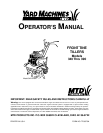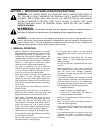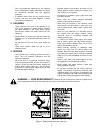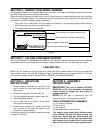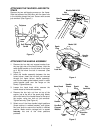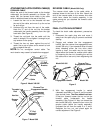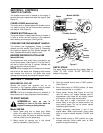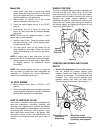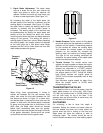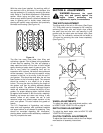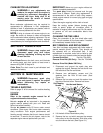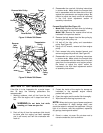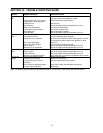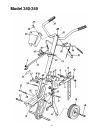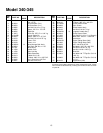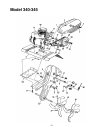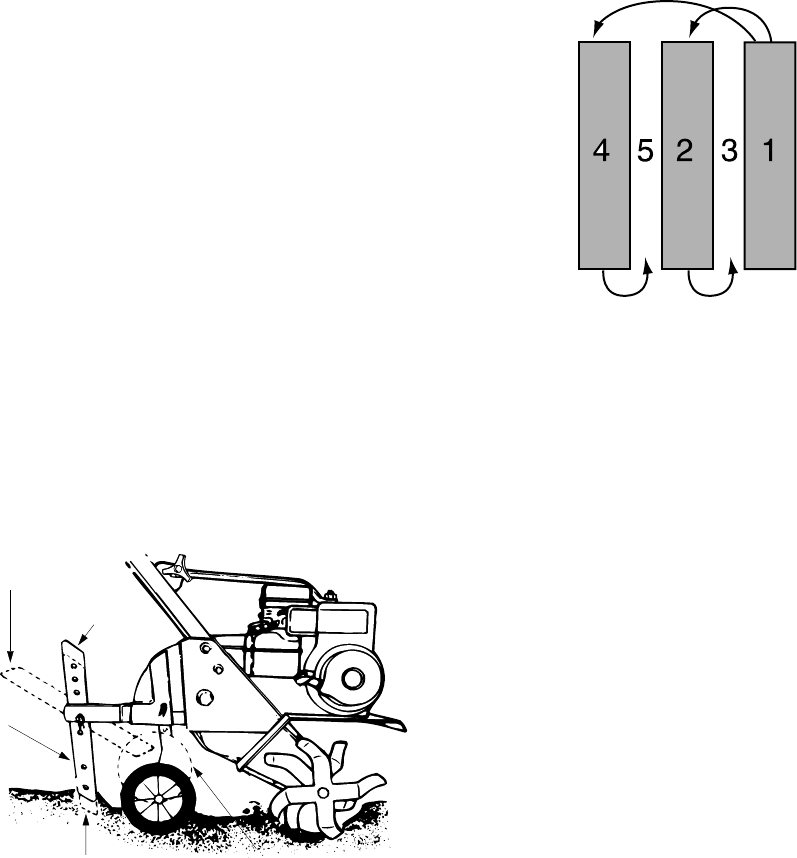
9
2.
Depth Stake Adjustment:
The depth stake
acts as a brake for the tiller and controls the
depth and speed at which the machine will
operate. Remove the clevis pin and hairpin clip
to raise or lower depth stake. (See Figure 10.)
By increasing the depth of the depth stake, the
forward speed of the machine is reduced, and the
working depth is increased. (See Figure 12.) When
the depth stake is raised, the working depth of the
machine is reduced and the forward speed is
increased. The working depth of the machine may
be predetermined by setting the depth stake and
wheels so that the wheels are about four inches
from the ground when the tines and depth stake are
resting on the ground. This setting will permit a
working depth of about four inches. When presetting
the working depth, the handles should be adjusted
so the hand grips are a little above waist height
because the tiller will be lower when the tines and
depth stake penetrate the ground.
Figure 12
When tilling, leave approximately 8 inches of
untilled soil between the first and second tilling
paths, then make the third path between the first
and second as shown in Figure 13. In some soils,
the desired depth is obtained the first time over the
garden. In other soils, the desired depth is obtained
by going over the garden two or three times. In the
latter case, the depth stake should be lowered
before each succeeding pass over the garden.
Passes should be made across the length and width
of the garden alternately. Rocks which are turned
up should be removed from the garden area.
Figure 13
3.
Handle Pressure:
Further control of tilling depth
and travel speed can be obtained by variation of
pressure on the handles. A downward pressure
on the handles will reduce the working depth
and increase the forward speed. An upward
pressure on the handles will increase the
working depth and reduce the forward speed.
The type of soil and working conditions will
determine the actual setting of the depth stake
and the handle pressure required.
4.
Throttle Control:
The throttle control lever
adjusts the engine speed and stops the engine.
With the throttle control lever pushed completely
forward, the carburetor is in START position.
Pulling the throttle control back slightly adjusts
the engine speed to FAST. Pulling the throttle
back further reduces the engine speed to
SLOW. Pull the throttle completely back to stop
the engine.
Use maximum engine speed for deep tilling.
Move the throttle control to SLOW when
transporting the tiller.
TRANSPORTING THE TILLER
To transport the tiller to or from the garden, pivot the
depth stake forward, out of the way. (See Figure
12.) With the throttle control in SLOW position, the
unit will walk freely on top of the lawn. If the
operator does not allow the tiller to move freely, the
unit will start to till the surface.
CULTIVATING
For cultivating, a two to three inch depth is
desirable. Setting the wheels and depth stake so
that the wheels are about two inches above the
ground while the tiller is resting on the tines and
depth stake will allow the machine to work at
cultivating depth. The throttle should be set to
control forward movement to a slow walking speed.
Shallow
Tilling
Fast
Forward
Transport
Position
Depth
Stake
Deep Tilling
Slow Forward
Raised Wheel Setting
for Deep Tilling



